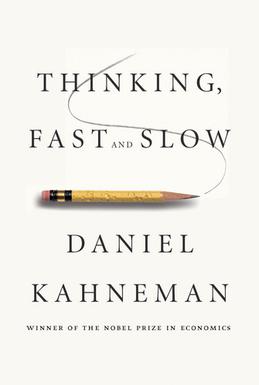
A list of notes from Thinking, Fast and Slow by Daniel Kahneman.
Introduction
Kahneman aims to improve the ability to identify and understand errors of judgement and choice, by providing a richer and more precise language to discuss them.
Judgement means the evaluation of evidence to make a decision. Judgement is also the ability to make considered decisions. wikipedia
Judgement goes hand in hand with decision making - the cognitive process resulting in the selection of a belief or course of action among several possible alternatives.
He early work questioned the (formerly) broadly accepted ideas of social science:
- Humans are generally rational and their thinking sound.
- Emotions, such as pain and fear, explain most of the irrationality in humans.
His Judgement Under Uncertainty: Heuristics and Biases article showed how people use simple heuristics in assessing probabilities and making predictions of judgements; and how these heuristics sometimes lead to systematic errors (biases).
The article discusses three heuristics:
- Representativeness
- Availability
- Adjustment and Anchoring
Representativeness
When asked to judge the probabilities of an object A belonging to a class B, we normally tend to ignore statistical evidence in favour of using the representativeness heuristic i.e. the degree to which A resembles B.
Classical example is that of a shy, tidy and orderly person being more likely to be a librarian than a farmer. The personal qualities fit the stereotype of a librarian even though statistical there are more farmers and thus a higher probability of the person being a farmer.
What is found intriguing is extra information actually impairs judgement.People will use prior probabilities correctly when no other information is available. However, with the addition of extra no informative "information", people ignore the prior probabilities. No evidence is better than worthless evidence
We do not intuitively apply statistics to our thinking.
We disregard the fact that small samples are not representative of entire populations (local representativeness does not exist) and observations made in the sample will be greatly diluted in the population.
Having several independent inputs when making predictions will improve their accuracy and having equally informative input on choices will improve choice making.
Availability
We assess the frequency of things based on the ease with which we can recall them i.e. how easily they're available to our minds.